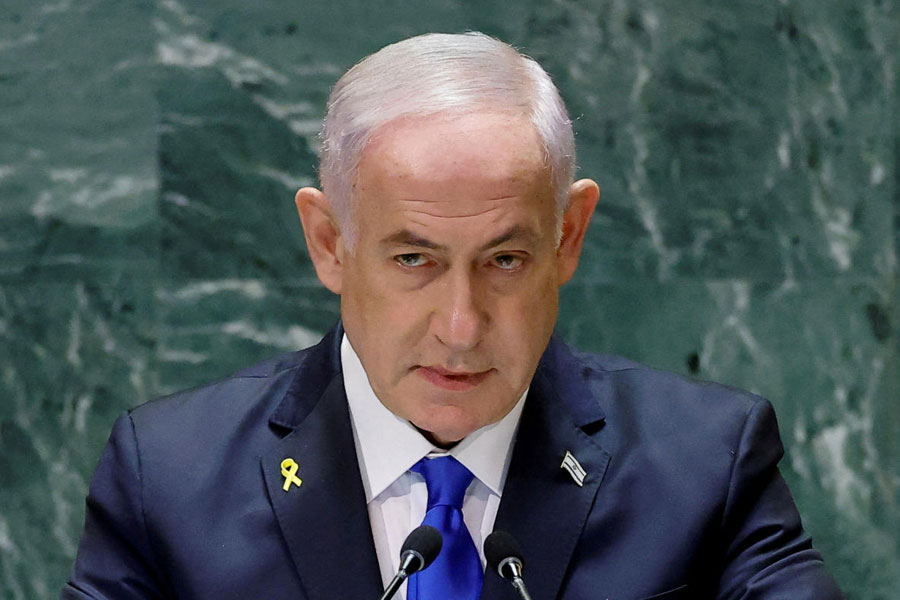A year ago, Saudi Arabia was preparing to recognise Israel in a normalisation deal that would have fundamentally reshaped West Asia and further isolated Iran and its allies while barely lifting a finger to advance Palestinian statehood.
Now, that deal is further away than ever, even after the killing of the Hamas leader, Yahya Sinwar, which has been widely seized upon as a potential opening for a peace deal. Instead, Saudi Arabia is warming relations with its traditional archenemy, Iran, while insisting that any diplomatic pact now hinges on Israel’s acceptance of a Palestinian state, a remarkable turnaround for the kingdom.
A diplomatic détente is underway in West Asia, but not the one envisioned by the Israeli Prime Minister, Benjamin Netanyahu, who continues to say that his administration can clinch a deal with Riyadh. This month, the foreign ministers of the Persian Gulf states met for the first time as a group with their Iranian counterpart. It is a shaky, early-stage rapprochement that will only chip away at centuries of sectarian antagonisms, but it represents a sharp shift in a region where the rivalry between Riyadh and Tehran has drenched the region in bloodshed for decades.
Tehran’s outreach continued after that, with the Iranian foreign minister, Abbas Araghchi, visiting Saudi Arabia before heading to other countries in the region, including Iraq and Oman, in an effort to ease tensions. He also visited Jordan before travelling to Egypt and Turkey. The visit to Egypt was the first by an Iranian foreign minister in 12 years, according to the Iranian news media.
“In the region, we now have a common grievance about the threat of the war spreading, and the wars in Gaza and Lebanon and the displaced people,” Araghchi said on Friday, when he landed in Istanbul.
While Netanyahu continues to reject the creation of a Palestinian state, Saudi officials have taken to newspapers and public speeches to put a two-state solution on the negotiating table. That, the kingdom has said, is the only way at this point for Israel to win favour with Saudi Arabia, largely seen as the leader of the Arab world.
What changed? Images started streaming out of Gaza of children buried alive under rubble, mothers grieving over their dead babies and Palestinians starving because Israel had blocked aid from entering the territory — all of which made it impossible for the Saudi leadership to ignore the issue of Palestinian statehood.
“What Gaza has done is set back any Israeli integration into the region,” said Ali Shihabi, a Saudi businessman who is close to the monarchy and sits on the advisory board of Neom, a futuristic city that is the pet project of Crown Prince Mohammed bin Salman, the kingdom’s future ruler. “Saudi Arabia sees that any association with Israel has become more toxic since Gaza, unless the Israelis change their spots and show a real commitment to a Palestinian state, which they have refused to do.”
For now, Saudi Arabia and its Gulf partners remain sceptical about the sincerity of Iran’s diplomatic overtures. But “as long as the Iranians are reaching a hand out to Riyadh, the Saudi leadership will take it”, said Shihabi, adding that, if Iran is serious, “that would be a true realignment of the Mideast”.
Saudi Arabia and Iran have long jockeyed for regional dominance, a rivalry shaped by the competing branches of Islam each country embraces.
While palace insiders like Shihabi admit that Saudi Arabia is no democracy, Prince Mohammed is sensitive to public opinion, which has hardened towards Israel over the past year.
The Gulf region has one of the world’s youngest populations; the average age of Saudis was 29 in 2022. Many of its citizens are transfixed by the endless stream of horrific images coming out of Gaza on their social media feeds, changing many of their once positive, or at least ambivalent, attitudes towards a deal with Israel.
In the months before the October 7, 2023, attack on Israel by Hamas, Saudi Arabia was planning an agreement with Israel that would have given Riyadh an expanded defence pact with the US and support for a civilian nuclear programme in exchange for normalising ties. While some other Gulf countries opened diplomatic relations with Israel in 2020 in a deal known as the Abraham Accords, they did not use their leverage to push Israel to create and recognise a Palestinian state.
In last year’s talks to normalise ties with Israel, a Palestinian state was never raised as a condition. But the situation in Gaza has upended that ambivalence.
In his first public comments advocating for a Palestinian state, Crown Prince Mohammed was unequivocal about Riyadh’s new demands. “The kingdom will not cease its tireless efforts to establish an independent Palestinian state with East Jerusalem as its capital, and we affirm that the kingdom will not establish diplomatic relations with Israel without one,” the crown prince said on September 18.
New York Times News Service










